#for japanese learner
Explore tagged Tumblr posts
Text
It's funny learning both japanese and chinese because in chinese when chinese learners complain about difficult words they are those that have simple strokes, about 3 or less pinyin pronunciations but have 58 different meanings and need specific usages where as in japanese, the difficult kanjis have 40 strokes like they've clawed all the way to earth from hell and have 80 different pronunciation but the meaning is pretty much the same across the words. So when I see chinese learners complain about a difficult word it's "guys, I think we should've left this word to die in classical chinese" but when japanese learners complain about a difficult word my response is either "that's just 8 radicals on top of each other. that's not hard" or "who angered a kami of kunyomi dominion, my god."
#studyblr#langblr#japanese language#chinese language#chinese langblr#japanese studyblr#chinese studyblr#don't mind the korean learners they're crying in the corner#because there's no way to differentiate hanja based advanced words that sound the same#you might think well it can't be bad but they're actively dying from the mountain of vocabs they're supposed to know#because “you can read all of them so you should know all of them” jfc
302 notes
·
View notes
Text

hello language learners! new this month in the language village, a chill way to practice a little bit every day: the one sentence club! as the title suggests, the idea is to write one sentence in your target language(s) every day. for an extra challenge, especially if your target language uses a different script, try handwriting the sentence too!
join the language village discord server to receive daily reminder pings, get inspiration from a daily question prompt, and participate alongside other one sentence club members!
feel free to tag #langvillage if you post your sentences on tumblr ✨
#the server hosts learners of over 50 different languages! our most popular languages by member count are ->#arabic#chinese#dutch#english#finnish#french#german#italian#japanese#korean#latin#norwegian#polish#portuguese#russian#spanish#swedish#ukrainian#langblr#language village#language learning#discord server#langvillage
84 notes
·
View notes
Text
レタスクラブ
I wanted to recommend レタスクラブ to advanced Japanese learners.

レタスクラブ (Lettuce Club) is a site that has both レシピ and 読み物 that someone introduced me to recently. I came for the 読み物, but the レシピ looks good too.
I have been reading through some of the comics under the 読み物 section 趣味, which has a variety of artists and themes to choose from. This is definitely a site for advanced readers, but if you'd like to try to navigate around the site you can practice reading.
Start Here for Comics, then try:
趣味
くらし
育児・子育て
Happy reading!
#レタスクラブ#reading japanese through manga#comics#reading japanese for advanced learners#reading in japanese#読書#tokidokitokyo#tdtstudy
114 notes
·
View notes
Text
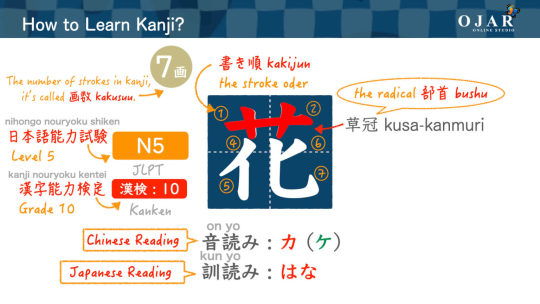
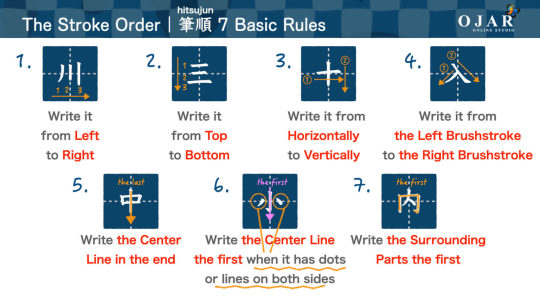
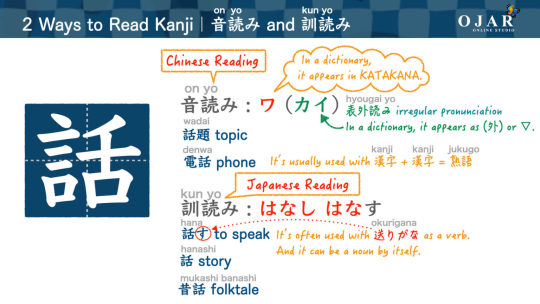
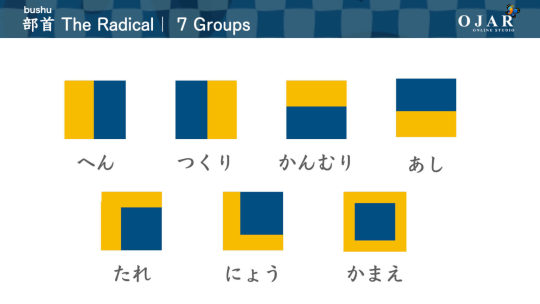
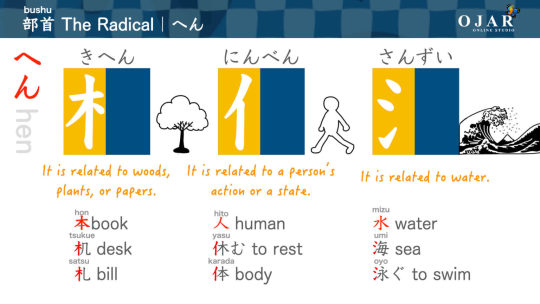
i was very surprised at how difficult it was to find (good) resources for learners that accurately describe how 部首 (in English we translate this to be the "radical") work in 漢字 (kanji). i pulled these from a very comprehensive guide of kanji from おじゃちゃん, a native speaker who is also a language teacher and if youre interested in learning more, you should check out her full overview here.
to a beginner this might not be as useful - but when you get deep enough into japanese i think it's worth it to understand how kanji is actually used by native speakers. understanding how the radical works can also help you guess at meanings and recognize common patterns that may make memorizing kanji easier
#mocha speaks#japanese langblr#learning japanese#japanese kanji#typically most english-speaker-centric guides describe the radical as 'building blocks' of kanji#which makes sense as a memorization tool#however if you ever went far enough in your studies you might need to unlearn all of that - the radical is actually a classification system#i'll stop there at the risk of going on a tangent in the tags#but yeah being aware of what it is at least could be helpful down the road#especially if you want to start using native resources. bc they use the radical much more differently than a learner might be used to
117 notes
·
View notes
Text
Humans are like tape recorders.
To all language learners out there drilling grammar structures (and vocab to a lesser extent), I have some bad news. No matter how much you rote learn or memorise, you can’t say something* in a language if you haven’t already heard it said by someone else, many times.
In order for you to say something, you must have recorded it in your brain first.
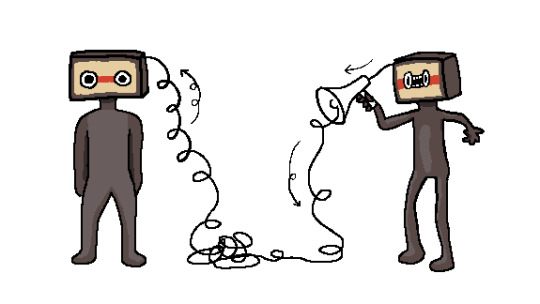
The reason for this is twofold.
If you haven’t seen or heard something actually used, how are you meant to know how it’s used!? Gonna go out on a limb and say not many people here are able to speak Pirahã. How would you say “I just drank some water” in Pirahã? You don’t know, right? Because you’ve never heard it said! In this respect, a language that you can’t speak at all is no different from a language that you can speak a bit, or even a language you’re fluent in.
Memorising stuff out of a textbook or flash cards is not sufficient to count as “hearing something many times”. It’ll give you some examples, but not enough (especially if what you’re memorising is the grammar structure itself, and not example sentences). Your conscious thought processes (which includes looking things up in long term memory) are simply too slow to be effective if they need to be used more than once every few seconds during conversation. Rote memorisation works at the conscious thought level, and is therefore only useful as a supplemental tool. Hearing something actually spoken (many times) internalises it on the subconscious level, which is what is needed for fluid speech and comprehension.
*That’s not to say that it’s impossible to ever say anything original. When I say you need to hear something before being able to use it correctly yourself, I mean you need to hear sentence structures and words, not necessarily whole sentences like a script.
Our brains are very, very efficient at acquiring language, provided we give them a non-stop stream of data to record (this is how babies learn - they don’t need textbooks). Then, the brain can cut up the tapes, analyse patterns, paste separate tapes together, and allow us to speak in our target language without manually recalling from memory.

What does this mean for you, the language learner? Put down the textbook and watch as much content in your target language as possible. Use the textbook/dictionary to help you look up something you’ve heard if you can’t figure something out from context, but that’s all it should be used for. Watch youtube, kids shows, regular tv, news, podcasts, anything you can find. And never use subtitles in your native language! Your brain will turn off the tape recorder automatically if it sees an easier way it can parse the information.
In this video, Matt (from the youtube channel Matt vs Japan) says the following, which I have translated to English:
こういうアドバイスする時に一番反論として出てくるのが 「でも観てもわからない!」 だから 「できない」 っていうんだけど、わからないからこそ観るべきだよね --- When I give the advice [to go hard on consuming input], the biggest counterargument people have is “When I watch it, I can’t understand what they’re saying! So it doesn’t work.” but it's actually the opposite: you don’t understand it, therefore you need to watch it!
The reason you should watch it is you don't understand it! You can’t understand it until your brain has recorded it!
#i should mention that this mainly applies to language learners whose goal is to actually converse with native speakers#people who have no intention of speaking the language feel free to rote memorise to your hearts content#but learners who are interested in conversing - youre wasting your time if youre rote learning grammar structures like maths equations#language#japanese#learning japanese#japanese language#langblr#linguistics#language learning#language acquisition#jimmy blogthong#my art#ms paint vibes#official blog post
177 notes
·
View notes
Text
12月の覚えた単語
パート1☆

執筆 しっぴつ writing (n.)
ズキズキ throbbingly (of pain)
口実 こうじつ excuse
途端 とたん just (now, at the moment, etc.); just as; in the act of; as soon as
記事 きじ article; news story
汚れ よごれ dirt; filth; stain; blot; spot
抜け道 ぬけみち shortcut
痕跡 こんせき trace; mark; sign; evidence
絞る しぼる to narrow down
妄想 もうそう delusion
叱る しかる to scold; to chide
#日本語#日本語の勉強#単語#langblr#language learning#japanese language#漢字#studyblr#study blog#study motivation#anime#アニメ#free-learner
41 notes
·
View notes
Text

if you've ever heard people express that kanji is hard but haven't had it explained why here us a taste: the sun character is in this word twice and it is pronounced completely differently both times
#txt#when i first started studying i thought there was only one kunyomi and one onyomi pronunciation for each character#but no there can be multiple of each ghdhxhd#sorry im sure its tired for japanese learners to say kanji is hard LOL i just always have little moments of ohhhh. this is very different#the history of kanji is very cool though i actually had no idea kanji is specifically chinese characters until i started learning
15 notes
·
View notes
Text
I was looking up "how many words to learn to read japanese" and oh my was there a surprising result. The various reddit posts seemed to say at least 10,000 words as that is what is on N1, while also saying it may just be the beginning of reading at 10,000 words and you'll still be looking up many words per page.
I am a bit confused by this answer, and still looking for a possibly truer one. Im looking for: how many words must a person learn in japanese to start reading materials for native speakers, if they look up a word every few sentences? Or even 1-3 words per sentence to start. So this would be maybe 80-90% reading comprehension (and with word lookup they'd boost that to 90% or more), with some simpler materials (like say Yotsuba or Ranma or School Rumble mangas) being 90% comprehensible before word lookup (and 95% or more comprehensible after word lookup).
For comparison: in French the number of words to start reasing was 1000-2000 (at least what I personally experienced), with 1000 being when I could read if i looked up 1 word per sentence or a a few words a paragraph. Chinese was also 1000-2000, the average webnovel felt more comfortable once learning 2000 words (at which point looking up 1-3 words or less a sentence or paragraph became doable), and for novels for children and some manhua just knowing 1000 words was enough to read while looking words up (for example, 秃秃大王 would be very readable with a 1000 vocabulary you know and looking up a word every sentence or so, and if your vocabulary is higher you may only look up words once every few paragraphs). For both french and chinese, once i learned lets estimate around 3000 french words or 3000 chinese hanzi (which is ultimately over 3000 words they can combine into which you can guess the meaning of... maybe by several thousand more), then there were at least SOME reading materials that could be read extensively with NO word lookups and using only context to guess the meaning of everything. In short: french and chinese basically matched up to what most "learn to read in a language" articles suggest you learn, which is around 2000 words to start reading with the aid of dictionary/translation word lookup, and then eventually work your way toward a goal of ~9000 words to read most materials comfortably. And along the path from 2000-9000 words, you'll find some materials that become readable to you aa you learn more words - without any dictionary/translation aids.
With Japanese reddit learners (as thats the forums i could browse): Refold learning plan used to suggest learning Tango N5 and N4 and 1000 basic kanji, so around 1000-2000 words, then to immerse with reading (sometimes at first just japanese show subtitles). The older Mass Immersion Approach (same overall study methods) used to do the 2,000 Core Japanese deck, or a personally made variant, and then around the end of that suggest people start including practicing reading. Sometimes people used the Core 6000 Japanese anki deck (more words), or used the nukemarine Lets Learn Japanese deck (i did this... it had 6000 words, around 2000 kanji, and tae kims grammar guide in it, and then later on some additional vocabulary from specific shows... i only learned about 1000 kanji and 2000 words from this deck before stopping). So for MIA and Refold learners, at least SOME of them started reading with word lookups around 2000-6000 words learned.
My question is: when did YOU feel comfortable starting to read Japanese reading materials for native speakers, with the use of word lookup tools (translation/dictionary)? When do you see some people got comfortable starting to read with word lookups? Did some people do something like Satori Reader (graded reading app) when they'd learned X words, until they'd increased their vocabulary to Y words? What was the vocabulary level at which they started to read japanese with word lookups? I think that for a lot of people, the point when they started reading materials for native speakers (with the help of word lookup tools) was Before they had learned 10,000 words.
(Ignore grammar knowledge, yes that greatly effects reasing comprehension. Id just like to focus on number of words a person knows when they start reading with word lookups).
#rant#how many words to read japanese#japanese#japanese langblr#studyblr#yes i am going to go dive into reddit again and see if i can find any posts of ppl specifically mebtioning starting reasing at X words#because with the seadch terms i used... i was only seeing the recommendation 10k words first.#wjereas i suspect Refold and MIA subreddits might mention the vocabulary learners had when they initially started reading
14 notes
·
View notes
Text
Learn Japanese: 5 Must-Know Summer Phrases


1. 暑いですね (Atsui desu ne)
Meaning: "It’s hot, isn’t it?"
2. 夏休み (Natsu yasumi)
Meaning: "Summer vacation"
3. 花火大会 (Hanabi taikai)
Meaning: "Fireworks festival"
4. かき氷 (Kakigōri)
Meaning: "Shaved ice"
5. 夏祭り (Natsu matsuri)
Meaning: "Summer festival"
#travel#japan travel#japan#japanese#language learner#foreign languages#langbr#japan aesthetic#study inspiration#studying#study blog#studyspo#study motivation#studyblr#study aesthetic#linguistics#language#words#culture#asian#light academia
8 notes
·
View notes
Text
07/25/2023
daily doodle・今日のrkgk

(⊃。•́ •̀。)⊃━🌈💞
今日、働こうとするでも、3も時が眠た。あたしの眠るのに関して医者が電話をするの待っている。眠る試験が予定をしなくてはいきない。
日本語を読むのもっと色々勉強品が見つけたい。n5/n4の読書の大半は新聞の記事。つまらない。流行とアニメとなどを読みたい。
また、n4の練習問題がした。15の中に7は正しかった。読むは聞くともっと練習をしなくてはいきない。
読んだ:魔道祖师5本(蓝忘机のような彼氏はどこ?!ピエンピエン)
見た:ZOM100
聞いた:Dancing Ghost's Ball-Jointed Darling ー Mili
☆⋆。🌟°‧★
Today, I tried my best to be productive but I still ended up taking 3 or so naps. I'm still waiting for my sleep doctor to call me back to schedule my sleep study.
I'm looking for more material for japanese reading practice. Most "N5/N4" dedicated collections are news articles which I find boring. I'd like to read about fashion and anime and trends and such.
Also, I did the N4 practice questions today. I got 7 out of 15 right. I really need to work on my reading and listening comprehension.
Reading: Grandmaster of Demonic Cultivation Vol. 5 (WHERE CAN I FIND SOMEONE LIKE LAN WANGJI??? i am crying on the floor)
Watching: ZOM100
Listening: Dancing Ghost's Ball-Jointed Darling by Mili
56 notes
·
View notes
Text
Okay, so everyone knows, don't learn Japanese from anime for many reasons, but we aren't here to talk about that
I think, as someone learning Japanese, watching Japanese television with japanese subtitles or lyrics videos for songs (I'm a pretty big vocaloid and pjsk fan so thats how I got the idea) is a really good way to learn the characters
Now, since Japanese can have characters that are multiple Roman characters long, this isn't a solid plan. You still have to practice on your own. However, if you know some of the characters, this can help you out with this practice. Also, if you somewhat know a character but haven't fully memorized it yet, this would be good for a reminder sort of way and get it into your brain.
#this is something ive been doing for a few days and its pretty helpful#It can work for other languages#like Russian or Mandarin or smth.#this isn't the best with words#but like for characters#I think it could be good.#japan#japanese#language#language learning#language learner#japanese learning#tips#helpful
10 notes
·
View notes
Text
HEY!! JAPANESE LANGBLR! i have another question </3
so like... names! i hear that katakana is for writing names + foreign words, but i see names written in hiragana, katakana, and kanji. so i'm, confused.
is it not strictly katakana? is it up to preference? is it specifically foreign names are written in katakana and japanese names are written in kanji or hiragana? is, say, writing a name written in katakana in hiragana/kanji or vice versa wrong? i've been wondering for a while but i just dunno where to look </3
ty in advance </3..
#learning japanese#japanese langblr#langblr#language learning#language study#┊♪┊. kieren's rambles#studyblr#japanese learner#shoutout to utaites for making me notice this
11 notes
·
View notes
Text
Japanese Studies - Self Care Edition
Japanese language-themed self care ideas, for those tough days:
brew a cup of your favourite Japanese tea in your favourite mug
read a favourite manga
cut up seasonal fruit (asian pears, apples, persimmons, etc.) and arrange it nicely on a plate, then use a tiny fork to eat it
watch a slice of life drama, anime, or documentary about Japan
listen to your favourite Japanese band or singer
fold origami
read a Japanese poem (original Japanese or translated) - e.g. haiku, renga, waka, tanka - or try to write one of your own, in Japanese or English
consider nature around you, in terms of wabi (transient and stark beauty), sabi (the beauty of imperfection and aging), and yūgen (profound grace and subtlety)
watch a Japanese children's show or something that makes you feel nostalgic
write something to your future self in Japanese with cute stationery and seal it for later
Don't forget to take a break from your studies to rest and relax and take some time for yourself!
23 notes
·
View notes
Text
burnt out on japanese learning recommendations tbh. I recommend uuhhhhhhhh downloading every menu and compiling them into a pdf and then reading that. in japanese. fuck it
#mocha speaks#japanese langblr#learning japanese#I hear so many and it's bc something different works for everyone so I'm not actually mad about it#but I'm just so TIRED u feel me#what is it about Japanese that makes it have this very specific learner culture..... (I know why)
53 notes
·
View notes
Note
have you seen / reviewed Short Stories for Japanese Learners? Is it worth buying? the ISBN is 979-8395674241
Thanks for asking about Short Stories for Japanese Learners! I haven't had the chance to read books from this series, yet, but I did check out some excerpts and it looks pretty awesome!
The concept seems to be identical to other graded reader series for Japanese with focus on the extensive reading approach and even the same five reading levels that e.g. the NPO Tagengo Tadoku promotes as well.


I like the accessibility of the language and the illustrations. Every story also seems to come with a vocabulary list, comprehension quizzes and a translation.
Looking around a bit I also found the author's website, where you can get a free PDF with 5 stories of their level 1 (Introductory Level) just by subscribing to their newsletter.
I think I'll arrange with my library to get some books from this series, so thanks again for bringing it to my attention!
#reading in japanese#study japanese#learning japanese#ask#japanese books#Short Stories for Japanese Learners#Japanese Language Park#japanese graded readers#japanese short stories#やさしい日本語
23 notes
·
View notes
Text
Mastering the Passive Reflexive 'Se' in Spanish
Introduction The passive reflexive ‘se’ is one of the most versatile and commonly used constructions in the Spanish language. It allows speakers to express actions in a way that emphasizes the action itself rather than who is performing it. This structure is particularly useful when the subject is unknown, irrelevant, or generalized. For example, instead of saying “Someone sells fruits here,”…
#A1#A2#B1#B2#C1#C2#daily prompt#DELE#English#grammar#how to use se in Spanish#Japanese language learning#language#latin america#Learn Spanish Online#mexico#My English class#My Japanese class#my language classes#My Spanish class#passive reflexive se in Spanish#passive voice in Spanish#reflexive verbs Spanish#se constructions in Spanish#siele#spain#Spanish#Spanish grammar exercises#Spanish grammar for advanced learners#Spanish grammar for beginners
2 notes
·
View notes